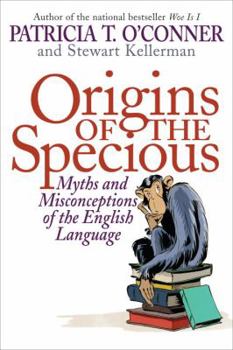Origins of the Specious: Myths and Misconceptions of the English Language
Select Format
Select Condition 
Book Overview
Do you cringe when a talking head pronounces "niche" as NITCH? Do you get bent out of shape when your teenager begins a sentence with "and," or says "octopuses" instead of "octopi"? Do you think... This description may be from another edition of this product.
Format:Hardcover
Language:English
ISBN:1400066603
ISBN13:9781400066605
Release Date:May 2009
Publisher:Random House
Length:266 Pages
Weight:0.90 lbs.
Dimensions:1.1" x 5.7" x 8.3"
Customer Reviews
5 ratings
Origins of the Specious
Published by Thriftbooks.com User , 14 years ago
This charming book diasbused me of many myths about rules of English grammar, their history, and current positions of the experts on rules. On top of that, the author is witty and open in her remarks, just the opposite of a curmudgeon. I recommend this book to anyone who is confused about the usage of English or who simply likes to read good (true) stories, delightfully told.
"English is all about change."
Published by Thriftbooks.com User , 14 years ago
"Origins of the Specious," by Patricia O'Conner and her husband, Stewart Kellerman (who graciously allows Pat to write from her point of view,) is a delightful romp in which the author explores the intricacies of our maddening and often illogical language. Since Pat wrote "Woe is I," people have been inundating her with questions and observations. In response, she wrote this book to help language junkies avoid making fools of themselves. O'Conner slays a number of sacred cows and will likely receive nasty letters and emails from word mavens who disagree with her. The author emphasizes that "perhaps the biggest myth of all is that English never changes, that it's immutable...But its ability to renew itself is what has kept English alive and kicking." Here are a few questions to get you thinking: Should we always avoid concluding a sentence with a preposition? Is it a sin to split an infinitive? When did the Brits start speaking like Simon Cowell? Is it correct to say, "Hopefully, you will stop making so many grammatical errors"? Does niche rhyme with "leash" or "twitch"? Do such words as "gangsta," "bling," and "phat" deserve to be "dissed," or have they become part of our modern lexicon? What is the plural form of "octopus"? For answers to these and other intriguing questions, fascinating insights into unusual etymologies, and an exploration of a few common misconceptions that have persisted over time, pick up this pun-filled, witty, entertaining, sometimes salacious book. Although purists will undoubtedly balk at a few of O'Conner's more outspoken comments, sooner or later even the most stuffy traditionalist will be forced to admit that no individual can dictate (or even predict) how the English language will evolve.
The best for language mavens
Published by Thriftbooks.com User , 14 years ago
If you love language, you won't find a better guide through the twisting alleys of English than Pat O'Conner. Since her first book, Woe Is I, through the current Origins of the Specious, Pat never fails to write fascinating and fun examinations of the English language. With a keen eye for the aspects of grammar, usage, and syntax that are most interesting, she points out little-known facts and etymologies of how we speak, and why we speak the way we do. And Pat is no stuffy grammarian, insisting that the old usages be maintained if they don't serve us well to communicate clearly. In this book, she debunks so many misused word, phrases, and idioms, some of which have commonly-believed origins which she explains, as well as misconceptions about usage, in particular the way some grammarians have tried to adhere to Latin grammar only to increase confusion and frustration about proper English usage. If you have an interest in language, get a hold of this book. And while you're at it, you might as well get her other books - after reading one, you'll certainly become an O'Connerophile. (Note: it's mentioned at the beginning of the book that both Pat and her husband, Stewart Kellerman, wrote it together, but that for purposes of clarity, they wrote it as if in Pat's voice alone. In that spirit, I've written this review addressing all comments to her. As I'm sure she would like, I want to say that all of this applies to Stewart as well.)
Terrific on all counts
Published by Thriftbooks.com User , 15 years ago
Another great offering from my favorite grammar maven, once again teaming up with her husband Stewart. The writing, as one expects from this duo, proceeds apace with wit and insight, dispelling a myth here and granting permission there. I was so relieved to know that I can split my infinitives at will and end my sentences with a preposition - and that I am in superbly historic linguistic company when I do. The word and phrase origins are fascinating. I guarantee this one will settle more than a few late night arguments - best to keep it right by the bed - or behind the bar.
Bookmark This One
Published by Thriftbooks.com User , 15 years ago
I am a fan of Woe is I, Updated and Expanded 3rd Edition: The Grammarphobe's Guide to Better English in Plain EnglishUpdated and Expanded 3rd Edition and Woe is I Jr.: The Younger Grammarphobe's Guide to Better English in Plain English but this book on language myths and misconceptions tops them both. It is so interesting and informative that I read it cover to cover in one sitting and have already gone back to some sections. How many words Eskimos really have for snow (p. 146) and how ivory towers got to campus from the Old Testament (p. 166) are two favorites. And I'm mentally bookmarking the nuanced history behind "call a spade a spade" (p. 126). It's a great example of the thoughtful way the rest of the book is written. Good reading!




